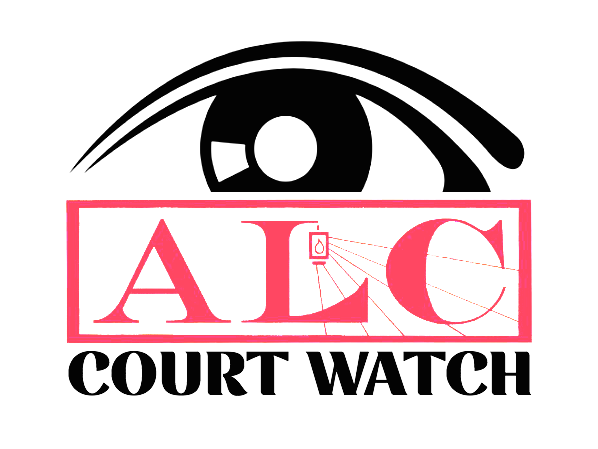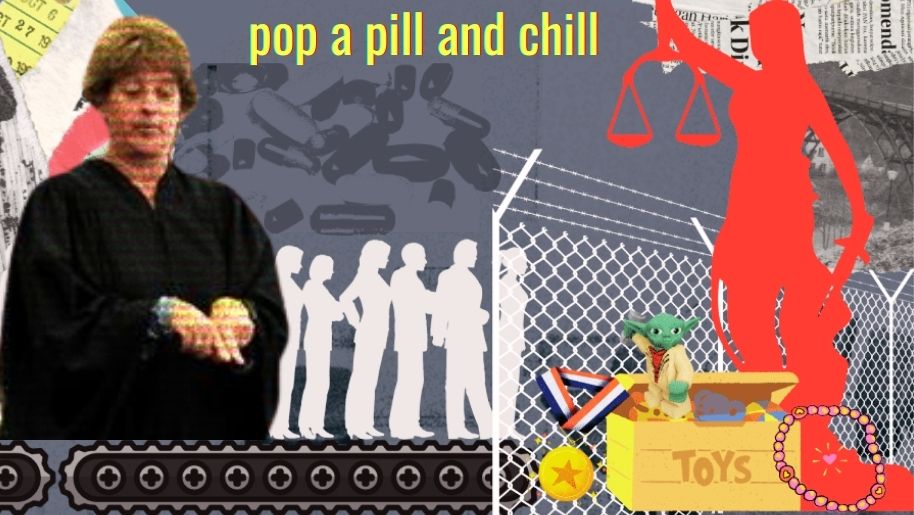by Leanne Fernandes, Court Watch Summer 2025 Intern
Entering a courtroom is expectedly quite an official, professional act. Entering most of the courtrooms of Allegheny County Courthouse, one can expect a typical room with wood paneling, symmetrical seating, high ceilings, and an element of decorum and sophistication. Yet upon entering Judge Lazzara’s courtroom, while seeing all of these typical features, you are also greeted by approximately 51 pieces of Star Wars memorabilia, ranging from Baby Yoda plushies, Darth Vader masks, Yoda Easter baskets, to a Wookie Cookie jar. Instantly, that feeling of sophistication vanishes. In its place comes a horrifying sense of infantilism and belittlement. This almost childlike obsession creates an unnerving atmosphere that not only court watchers can clearly see, but defendants during trial as well. An interesting dialogue between Lazzara and a defendant during a trial perfectly encapsulates this:
–Defendant: “How come you got all this Star Wars stuff in here?”
–Lazzara: “You don’t like my decorations? I think Baby Yoda is pretty cool. I’ve even got Millenial Falcon earrings on. Do you like Star Wars?”
–Defendant: “I mean it’s alright.”
–Lazzara: “Alright well, it’s good to meet you even though you don’t like Star Wars. We may have some issues about that later on…”
While this may have been said as a joke, it feels inappropriate for a setting as professional as a courtroom. For the majority of these people, it is the most important day of their lives, and therefore taken very seriously. Having the eyes of dozens of plushies on you while finding out the fate of the rest of your life would send chills down your spine.
Judge Lazzara handles all mental health court proceedings in the Allegheny County Courthouse as the judge of the Mental Health Court—a specialty court that includes mental health review hearings, commitments, and competency hearings. After a “positive” mental health review, defendants are allowed to choose a prize from the Wookie Cookie jar and the “Chewboxa,” punningly named after one of Lazzara’s favorite characters, Chewbacca. Mental health court participants also receive a series of bracelets following a positive review with the printed words “hope”, “patience”, “courage”, and finally “strength”. Each bracelet symbolizes the steps needed in order to “graduate” from mental health court. If Lazzara deems a participant’s behavior positive enough to receive all bracelets at the end of their treatment program, they are invited to the annual Mental Health Court graduation ceremony.
While the sentiment of rewarding good behavior and personal growth as a result of their treatment program is admirable, it may also be interpreted as infantilizing these participants. They have gone through the arduous process that is our legal system, most likely filled with real world and personal challenges. Giving out these prizes can easily be compared to giving a reward to children, or even a treat to a pet.
Mental illness has been burdened with an incredible amount of stigma over the course of history. During the past few decades, the mental health field has been making tremendous strides to reduce this stigma. Allegheny County’s Mental Health Court was seemingly another one of these strides in the right direction—providing people with the opportunity to get treatment for their illness, while also allowing them to better acclimate to their environment through adjustments they’ve made in their lifestyle. These programs, whether inpatient or outpatient, take a lot of hard work and dedication. These people are struggling with a plethora of problems, including drug addiction, handling their mental health symptoms, managing their medication and its side effects, going through the legal process, while also dealing with the consequences of the unfortunate incident that brought them to court in the first place. Not only does mental health require navigating medications, but also all of the other factors that need to be considered with it. Recognizing all of the nuances of dealing with mental illness requires proper education. A lack of this education can increase the stigma surrounding mental health conditions and reverse the progress in the field in recent years.
Court watchers can witness some of these instances in MHC. Lazzara’s favorite line during mental health reviews that increases stigma is to tell people:
“Mental illness is a totally different thing. All you have is a chemical imbalance, it’s not a big deal. Have you heard of diabetes? Well, diabetics take their insulin to treat their chemical imbalance. So it’s the same thing for you. All you need to do to treat your illness is take your medication exactly as you’re told, and you’ll be fixed. I have a thyroid condition and every morning I take my little pill to treat my thyroid condition. So all you have to do is take your little pill or two. Whatever they tell you to take, you take. ”
Mental Health Court meets weekly on Tuesdays. Over the course of 2 weeks, this statement was spoken verbatim 6 times. While, granted, medication is extremely important to help treat those with mental illness, it is only one step of a long-term process. By broadly comparing diabetes to all mental health illnesses, the stigma of mental health instantly increases yet again. This oversimplification of mental health treatment is not present for more physical ailments. Yes, diabetes is a chemical imbalance. You must take the right amount of insulin to fix blood sugar levels. Yes, mental illness is also a chemical imbalance. You must take the right dosage of medication to treat that chemical imbalance.
However, if that’s all that mental illness is, no one would have any problems in the world—or at least those with access to affordable healthcare. Those incarcerated definitely have access to all sorts of healthcare options at the highest possible level, right? Their symptoms and side effects are carefully monitored, right? And their behavioral changes with said medication are being carefully monitored, right? In reality, there are finite resources available at Allegheny County Jail. There is only so much staffing available to tend to the needs of these complex illnesses. Medications need to be adjusted accordingly to treat these illnesses and their vast accompanying side effects.
To properly treat mental illness, a combination of medication and therapy is almost always necessary. Therapy is one of the most important steps of treating mental illness, whether that’s cognitive behavioral therapy, existential therapy, or even a more holistic approach. While medications treat this chemical imbalance, therapy helps people learn coping mechanisms, healthy ways to alleviate stress, and better methods to express emotions—all of which are steps important for rehabilitation, which is allegedly one of the main goals of the penitentiary system. Treating mental health illness is a carefully curated process over a long period of time. People endure so many different struggles, particularly those in the carceral system, that a pill or an injection could never cure. The idea that simply taking your medications will solve all of a person’s problems is a grievous oversimplification of the complexities that mental health entails.
Understanding your own mental health struggles is also a key factor to successfully treating symptoms. The goal of the Mental Health Court is to do just that. According to the court’s official website:
“It is the purpose and passion of the Mental Health Court to help individuals accept, understand, and embrace their mental health conditions and, when needed, help them overcome addiction so that they can live better, more stable, productive, and fulfilling lives. We do this by creating a safe, supportive, and nurturing community where participants can begin their journey forward. It is our purpose and passion to enable individuals with mental health conditions to thrive in all aspects of their lives.”
Therefore, it is the court’s duty to help these people in all aspects of life. However, to be able to embrace these conditions and live a more stable and fulfilling life, additional rehabilitative measures should also be put in place, such as an increase of therapy. Simply taking medication cannot be the only way to treat mental illness. If the goal as they say is truly to thrive in all aspects of life, taking a pill and moving on would never help someone to fully embrace their mental health condition. A diabetic does not need to necessarily embrace their conditions because it would not necessarily impact every facet of their daily lives. Mental health conditions affect every aspect of a person’s life. It is an adjustment to be able to live with your symptoms, while also improving yourself to live this “fulfilling life.”
While the goal of MHC is commendable, the execution could be improved upon. Judges should be given the proper training and education regarding mental health in order to better help the court’s participants, and to understand its complexities.

